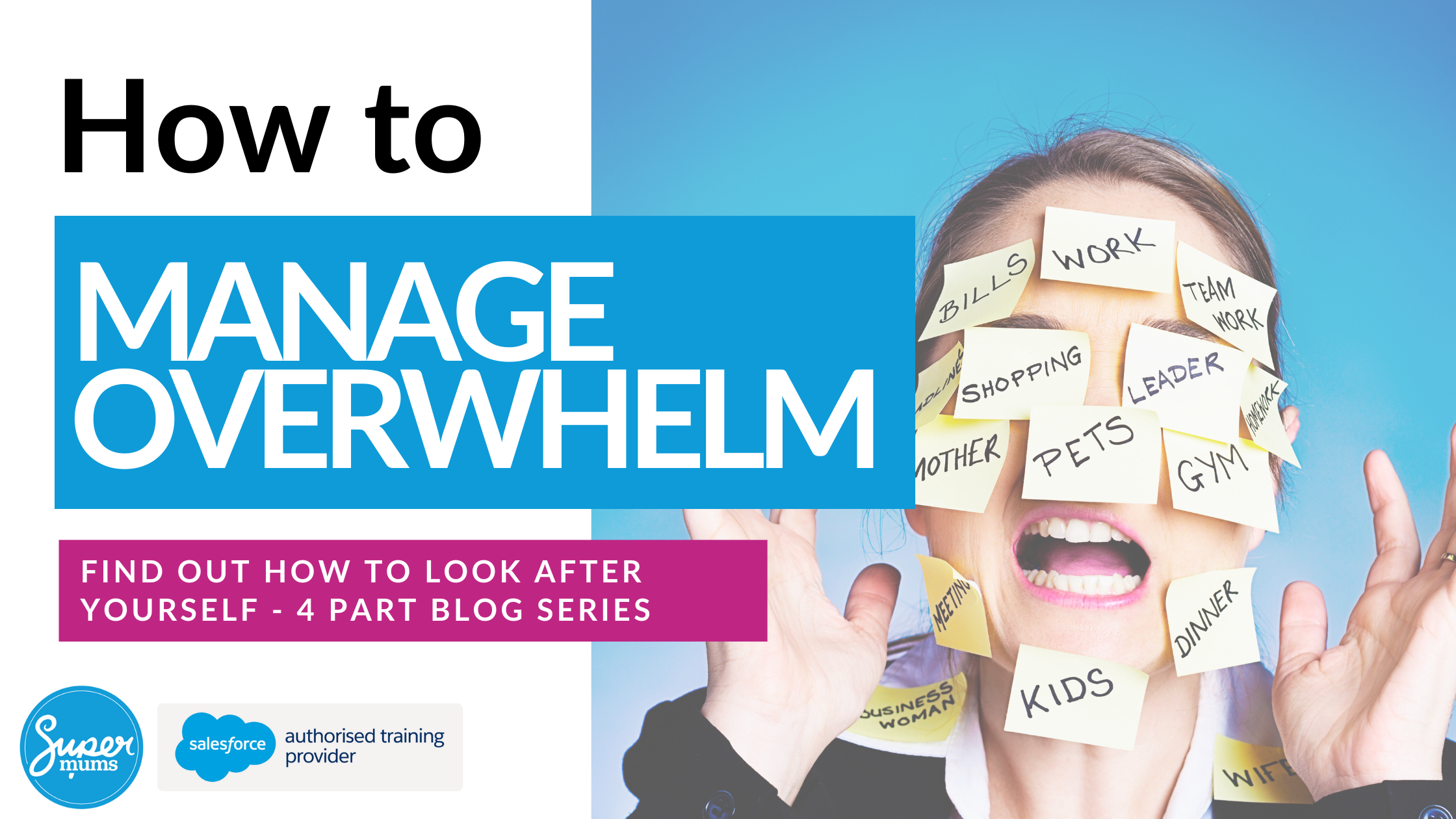Feeling Overwhelmed? Learn How to Manage it and Take Control of Your Life
By Heather Black

Over the next four weeks we are talking about burnout, anxiety, imposter syndrome and overwhelm, and sharing strategies on how to maintain positive mental health & wellbeing whilst launching and building your career alongside juggling personal and family life.
We are sharing strategies on:
- Part 1: How to prevent burn-out
- Part 2: How to reduce anxiety
- Part 3: How to overcome imposter syndrome
- Part 4: How to manage overwhelm
Sign up to our Weekly Career Boost Bulletin to stay up to date and get notified when each of the strategies are shared.
Also, get 5% off any of our Salesforce courses when you subscribe to our newsletter.

If you are returning to the workplace after a career break, launching into a new career or stepping into a new job role / promotion, you might experience anxiety or imposter syndrome.
If you are finding yourself working long hours, you are struggling to manage your own time or you are taking on too much as you are not able to say no to things, then you might be feeling a sense of overwhelm or burn-out.
In today’s world we can juggle a lot and we have to learn to self-manage our mind, our time, our ambitions and our boundaries. Working on our mental health and feeling in control of our life is really important to maintain momentum.
At Supermums, we are passionate about the power of coaching to help improve mindset and mental health. We have a team of career coaches that work with people launching and furthering their Salesforce career as they go through these emotional challenges.
If you are based in the UK the coaching support could be funded subject to eligibility.
Find out more about one to one coaching support here or join our Ambitious Women Mindset Summit to learn some coaching tools and techniques for free.



Marie Hannigan
Kelly Nash
Christina McLoughlin
How to Manage Overwhelm
In today’s fast-paced world, it’s all too easy to feel overwhelmed by the demands of everyday life. From work deadlines to personal commitments, it can sometimes feel like there’s simply too much to handle. However, overwhelm doesn’t have to be a permanent state. With awareness and effective strategies, it’s possible to manage overwhelm and regain a sense of control. In this guide, we’ll explore what overwhelm is, how to diagnose it, why it happens, and provide actionable steps to prevent it.
What is Overwhelm?
Overwhelm is a state of feeling mentally or emotionally swamped by too many tasks, responsibilities, or stimuli. It’s characterized by a sense of being unable to cope or manage everything on one’s plate. Overwhelm can manifest differently for each individual, but common symptoms include:
- Feeling stressed, anxious, or tense.
- Difficulty concentrating or making decisions.
- Procrastination or avoidance of tasks.
- Physical symptoms such as headaches, fatigue, or insomnia.
- Increased irritability or mood swings.
Diagnosing Overwhelm:
Recognizing the signs of overwhelm is the first step in effectively managing it. Some common indicators include:
- Feeling like you’re constantly juggling multiple tasks and struggling to keep up.
- Experiencing a sense of dread or panic when faced with new responsibilities or challenges.
- Difficulty focusing on one task at a time and feeling scattered or unfocused.
- Neglecting self-care activities or hobbies due to lack of time or energy.
- Finding it challenging to relax or unwind, even during leisure time.
Why Does Overwhelm Happen?
Understanding the underlying causes of overwhelm can help address it more effectively. Some common factors that contribute to overwhelm include:
- Overload: Taking on too many tasks or commitments at once can quickly lead to overwhelm. Trying to do everything at once without proper prioritization can quickly drain your mental and emotional resources.
- Perfectionism: Striving for perfection in every aspect of life can create unrealistic expectations and increase the likelihood of feeling overwhelmed. Learning to embrace imperfection and prioritize tasks based on importance can help alleviate this pressure.
- Lack of Boundaries: Failing to set boundaries with work, relationships, or personal commitments can result in an imbalance and lead to overwhelm. Learning to say no and prioritize your own needs is essential for preventing burnout.
- Poor Time Management: Inefficient time management practices, such as procrastination or failing to delegate tasks, can contribute to feelings of overwhelm. Learning to prioritize tasks, set realistic deadlines, and delegate when necessary can help manage workload more effectively.
Managing Overwhelm: Actionable Steps
Now that we understand what overwhelm is and why it happens, let’s explore some practical strategies to manage it:
- Prioritize Tasks: Identify the most important tasks on your to-do list and focus on completing them first. Break larger tasks down into smaller, more manageable steps to prevent feeling overwhelmed.
- Set Boundaries: Establish clear boundaries with work, relationships, and personal commitments. Learn to say no to additional responsibilities that don’t align with your priorities or values.
- Practice Self-Care: Make self-care a priority by prioritizing activities that nourish your mind, body, and soul. This can include exercise, meditation, spending time in nature, or engaging in hobbies you enjoy.
- Delegate When Possible: Don’t be afraid to delegate tasks to others when you’re feeling overwhelmed. Whether it’s at work or home, asking for help can lighten your load and prevent burnout.
- Break Tasks into Manageable Chunks: Instead of trying to tackle everything at once, break tasks down into smaller, more manageable chunks. Focus on completing one task at a time, and celebrate your progress along the way.
- Practice Mindfulness: Incorporate mindfulness techniques into your daily routine to help reduce stress and increase present-moment awareness. This can include deep breathing exercises, progressive muscle relaxation, or simply taking short breaks to clear your mind.
- Limit Distractions: Minimize distractions in your environment to help improve focus and productivity. Turn off notifications, close unnecessary tabs or apps, and create a dedicated workspace free from clutter.
What should YOU do next?
Overwhelm is a common experience in today’s busy world, but it doesn’t have to control your life. By recognizing the signs of overwhelm, understanding its underlying causes, and implementing practical strategies to manage it, you can regain a sense of control and balance. Remember, it’s okay to ask for help and prioritize your own well-being. With patience and persistence, you can master overwhelm and live a more fulfilling and balanced life.
Learn Coaching Tools
Join us for our Ambitious Women Mindset Summit to learn different coaching tools and techniques to improve your mindset.
Talk to us
Find out more about career coaching, and how it can support you by booking in a free consultation with our career coaches at Supermums.
Written By:
Subscribe To Our Weekly Top Tip Bulletin
Get Updates And Learn From The Best













